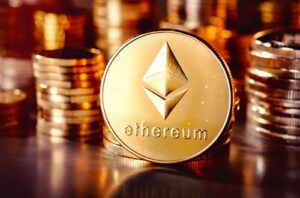Ethereum is a global, decentralised, open-source software platform that uses blockchain technology and smart contracts.
It was initially developed to facilitate the implementation of blockchain technology across various projects. The platform’s native token is known as «ether» or «ETH».
History of Ethereum
Ethereum was created by Vitalik Buterin, who, at the age of 19, presented the first description of the platform in a «Whitepaper» in 2013. Other co-founders include Gavin Wood, Charles Hoskinson, Anthony Di Iorio, and Joseph Lubin. Initially, Ethereum was referred to as the «new Bitcoin» (you can read more about Bitcoin in our related article).
 In 2014, Ethereum Switzerland GmbH was established in Switzerland, and in the second half of the same year, the project’s creators launched a crowdfunding campaign. The project quickly gained popularity, raising 31,591 bitcoins (approximately $18.5 million).
In 2014, Ethereum Switzerland GmbH was established in Switzerland, and in the second half of the same year, the project’s creators launched a crowdfunding campaign. The project quickly gained popularity, raising 31,591 bitcoins (approximately $18.5 million).
The first Ethereum block was created on 20 July 2015, and a month later, the blockchain platform started operating (you can read more about blockchain in our related article). Over time, the platform gained recognition within the crypto community and attracted the attention of major companies such as Microsoft, IBM, and JPMorgan Chase.
Renowned American film director Ridley Scott has expressed interest in filming the book «The Infinite Machine» by journalist Camila Russo, which details the creation of the cryptocurrency Ethereum (ETH) and the story of Vitalik Buterin. The release date of the film has not yet been announced.
Additionally, in 2024, a three-year project on a series of documentaries about the Ethereum ecosystem and its creator was completed. It is titled «Vitalik: An Ethereum Story», and the global premiere is scheduled for 18 February.
Ethereum features
The Ethereum network is a decentralised computing platform that supports smart contracts. Each transaction and its compliance with predetermined conditions are controlled by a computer algorithm without the involvement of a third party. This eliminates the «human factor» and ensures the integrity of the exchange of money, information, or property. A «distributed computer,» known as the Ethereum Virtual Machine (EVM), is responsible for executing smart contracts.
Within the Ethereum platform, each user can run their own code or interact with other users’ applications. The system’s flexibility allows for the realisation of projects with varying levels of complexity. Due to the decentralised nature of the network, such projects cannot be easily terminated or altered.
The Ethereum blockchain is one of the most complex and extensive on the internet. Unlike Bitcoin, which is primarily designed for transactions and storing value, Ethereum enables the creation of applications and smart contracts.
What is ETH?
 ETH, or ether, is the native cryptocurrency of the Ethereum platform. It can be used both to pay for the execution of transactions within the network and to purchase goods and services.
ETH, or ether, is the native cryptocurrency of the Ethereum platform. It can be used both to pay for the execution of transactions within the network and to purchase goods and services.
This cryptocurrency is the second largest in market capitalisation and popularity worldwide, second only to Bitcoin. It is actively traded on cryptocurrency exchanges, and some experts suggest that ETH could potentially surpass BTC soon.
Ether mining plays a crucial role in securing the network (you can learn more about mining in our related article). Since 2022, Ethereum has transitioned to the Proof-of-Stake (PoS) algorithm, which has reduced the role of miners. PoS significantly improves network speed and reduces energy consumption.
The ETH emission is unlimited; as of August 2024, the circulating supply has reached 120,288,941 ETH, with the total market value of all ether coins amounting to approximately 310 billion US dollars.
 In 2014, Ethereum Switzerland GmbH was established in Switzerland, and in the second half of the same year, the project’s creators launched a crowdfunding campaign. The project quickly gained popularity, raising 31,591 bitcoins (approximately $18.5 million).
In 2014, Ethereum Switzerland GmbH was established in Switzerland, and in the second half of the same year, the project’s creators launched a crowdfunding campaign. The project quickly gained popularity, raising 31,591 bitcoins (approximately $18.5 million). ETH, or ether, is the native cryptocurrency of the Ethereum platform. It can be used both to pay for the execution of transactions within the network and to purchase goods and services.
ETH, or ether, is the native cryptocurrency of the Ethereum platform. It can be used both to pay for the execution of transactions within the network and to purchase goods and services.